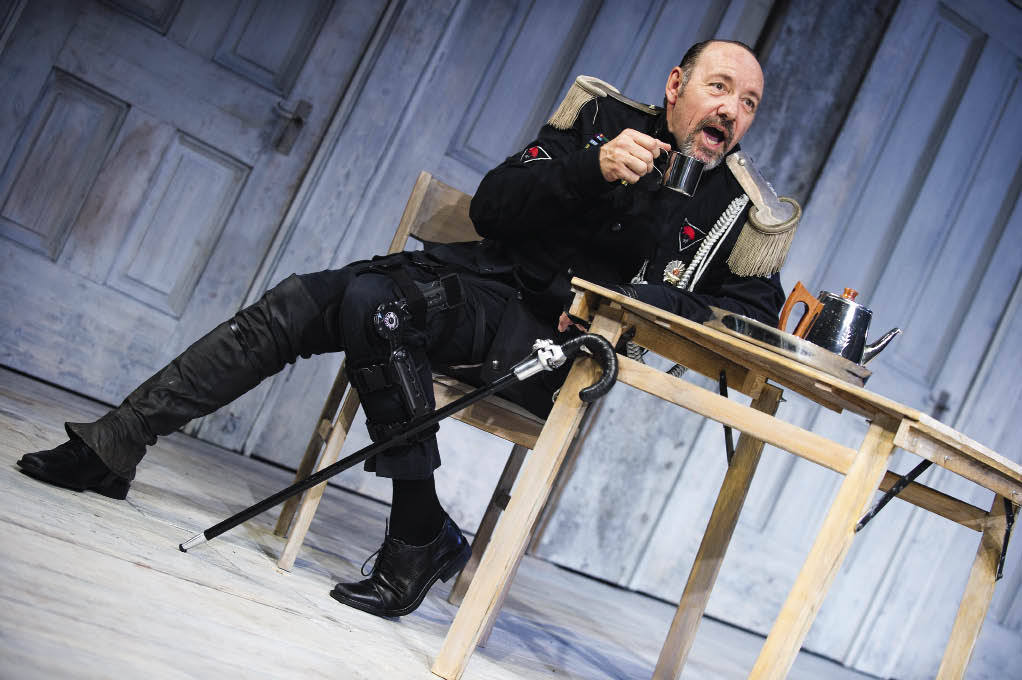Was it curvature of the spine? Was it a club foot? Was it just an epic dose of facial acne? We don’t know exactly where, how or in what degree Richard III’s deformities manifested themselves.
Was it curvature of the spine? Was it a club foot? Was it just an epic dose of facial acne? We don’t know exactly where, how or in what degree Richard III’s deformities manifested themselves. Nor did Shakespeare. So he just went with a hunch. In Sam Mendes’s modern-dress production, Kevin Spacey offers us Richard as a double paralympian. He has a mini-excrescence, like a junior dinosaur egg, obtruding meekly from the back of his crisply laundered white shirt. He also has a fabulously twisted and withered left leg, that is emphasised by a line of stylish black-leather buckles worn, as fashion apparently dictated, over his trousers. I make much of these peculiarities because the production does so, too.
There’s a sense of breathlessness in this show, an overhastiness to move from one postmodern experiment to the next. There are video feeds, doorways in odd perspectives, thunderous drums to accompany the battle scenes. When Richard first appears he wears a paper crown and blows a party hooter. War erupts and the costumes have to acquire a more soldierly air. So Richard dons a Michael Jackson tunic with tasselled gold epaulettes that wiggle in agreement, like the ears of a devoted spaniel, whenever he speaks.
Spacey’s Richard is thoroughly modern, thoroughly original, shamelessly American. He’s camp, snide, mercurial, conversational. A next-door-neighbour sort of usurper. He gets a lot of laughs, too. It’s quite a serious risk to approach such a celebrated play in this inventive, knockabout, almost improvised manner. It might easily have collapsed beneath the weight of its impish cleverness. But Spacey’s stage presence is the decisive factor. He plays the role with far more passion, verve and freedom than he brought to his oddly muted Richard II a few years back. Perhaps the scheming tyrant suits him better than the ousted loser.
He receives great support from Chuk Iwuji as Buckingham and from Haydn Gwynne as the heroically dignified Elizabeth. Not everyone will applaud this show. The scattergun visual style, the multicultural cast and the international flavour of the accents cost it much artistic integrity. There are a hundred good ideas here rather than a single great one. But Spacey is electrifying.
Hungarian playwright Ödön von Horváth, who died in 1938, was an astute observer and later a hapless victim of Nazism. ‘Nothing conveys a sense of the infinite better than stupidity,’ he wrote chillingly as Hitler’s followers seized power in Germany. His accidental death while living in exile in Paris might have been drawn from one of his plays. He took shelter from a thunderstorm and was struck by a falling branch while on his way to watch Walt Disney’s Snow White and the Seven Dwarves.
At Southwark Playhouse, a revival of his 1932 drama, Faith Hope and Charity, introduces us to Elisabeth, a saleswoman on the brink of destitution. Although the Nazis aren’t mentioned, the atmosphere of doomed nationhood and perverted authority haunt this subtle and unshowy play. Fined for non-possession of a work permit, Elisabeth tries to re-establish her good name but to do so she has to defraud the state bureaucracy and to risk criminalising herself further.
The petty heartlessness of those in power comes across very forcefully. Do the people rot the system or does the system rot the people? Von Horváth declines to answer. He merely illustrates the consequences that flow when a population enslaves itself to the letter of the law. There are bitter, mirthful touches everywhere. When Elisabeth tries to drown herself in a canal, she’s plucked from the water by a passer-by who immediately tries to convert his heroics into a publicity stunt and to generate custom for his parent’s business.
Rebecca Oldfield, a beautiful young actress, plays Elisabeth with a fine blend of demureness and desperation. Mind you, I expect she regrets having a large sky-blue tattoo blazoned across her upper thigh which, in the bedroom scene, looks a mite out of character for a nice bourgeois girl in 1930s Germany. Just occasionally the eight-strong cast are overwhelmed by the 15 roles they have to perform. In the drowning scene Elisabeth’s rescuer, referred to explicitly as a man, is played by an actress for some reason. But these are the sort of incongruities von Horváth would have relished. Once, while hiking in the Alps, he came across the corpse of a long-dead climber. After rummaging in the fallen man’s rucksack he found a postcard. ‘Having a wonderful time.’ Asked by his friends what he did next, von Horváth replied, ‘I posted it.’
Camp, snide, mercurial, conversational: Kevin Spacey as Richard III at the Old Vic







Comments